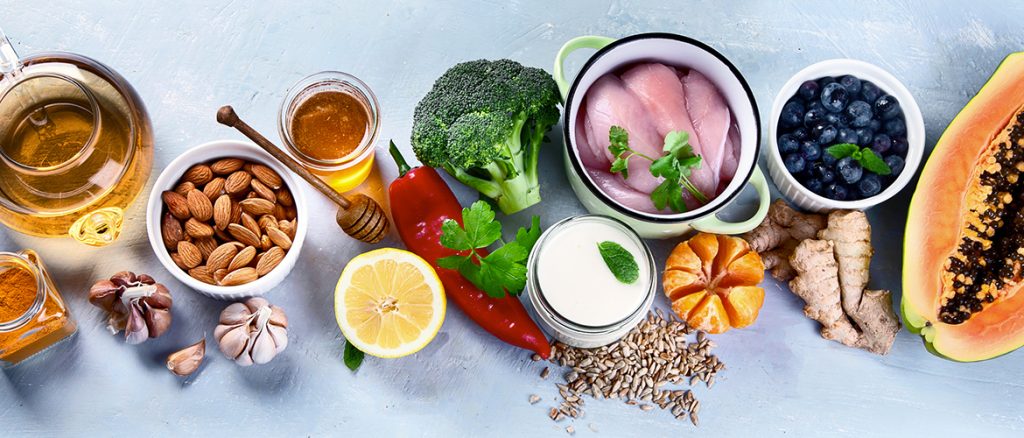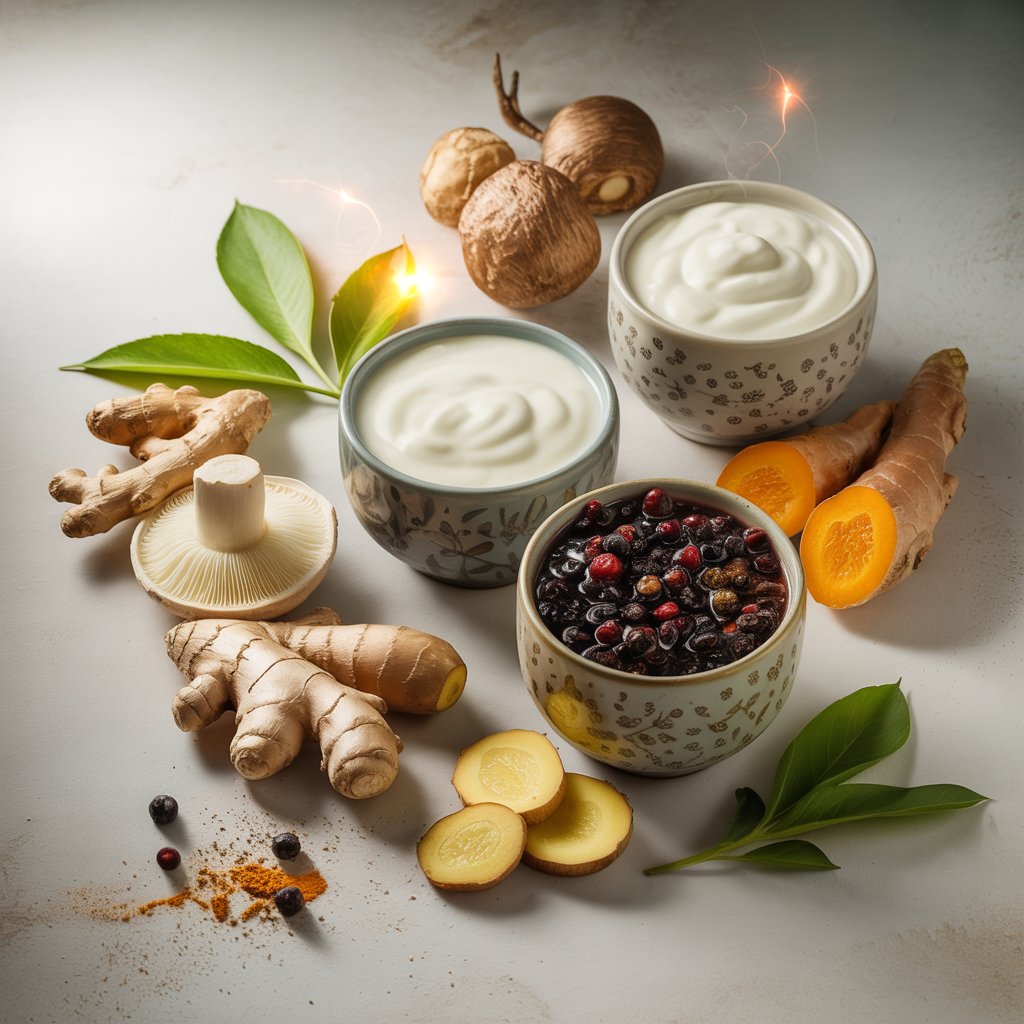Powerful Immune Support Backed by Science

INTRODUCTION
Your immune system is a remarkable, complex network that works around the clock to protect you from harmful invaders like bacteria, viruses, and other pathogens. It is made up of organs, tissues, cells, and proteins that all work together to keep you healthy and resilient. This system doesn’t just defend against infections—it also helps your body heal from injuries and recover from illness. Every day, your immune system identifies and destroys threats, distinguishing between your own healthy cells and foreign invaders.
The immune system has two main parts: the innate (or natural) immune system, which provides immediate, general defense, and the adaptive (or acquired) immune system, which learns to recognize and remember specific threats for faster responses in the future. This layered defense is what allows your body to fight off new infections and build immunity over time, especially after exposure to germs or through vaccination.

However, the immune system is not invincible. It can be weakened by factors such as poor nutrition, lack of sleep, chronic stress, certain medical conditions, and aging. Sometimes, it can even become overactive, leading to allergies or autoimmune diseases where the body attacks its own tissues. Because of this, supporting your immune system with healthy habits, balanced nutrition, and science-backed strategies is essential for long-term wellness.
In today’s world, interest in immune health has never been higher. Many people seek ways to strengthen their defenses, especially during cold and flu season or times of increased health concerns. But with so much information—and misinformation—about immune boosters, it’s important to focus on methods that are truly supported by scientific evidence. This guide will help you understand how your immune system works, what really supports it, and how you can make informed choices for your health.
Key Nutrients for Immune Health

Vitamin C
Vitamin C is a water-soluble vitamin vital for immune defense. It supports the production and function of white blood cells, enhances skin barriers, and acts as a powerful antioxidant. Research shows that regular vitamin C intake can reduce the duration and severity of respiratory infections, especially in people with low dietary intake.
- How it works: Boosts white blood cell production, supports skin barriers, neutralizes free radicals.
- Best sources: Oranges, strawberries, bell peppers, broccoli, kiwi, guava, Brussels sprouts.
- Recommended dose: 250–1,000 mg per day for adults.
- Tips: Fresh fruits and vegetables retain more vitamin C; avoid overcooking.
Vitamin D
Vitamin D is crucial for immune cell function and helps regulate the body’s inflammatory response. Deficiency is linked to increased susceptibility to infections, including respiratory illnesses.
- How it works: Activates immune cells, modulates inflammation, supports lung health.
- Best sources: Sunlight, fatty fish (salmon, mackerel), fortified milk, egg yolks, supplements.
- Recommended dose: 1,000–2,000 IU per day for adults; higher doses may be needed for those with low sun exposure.
- Tips: Get 10–30 minutes of midday sun several times a week; check your vitamin D levels with your doctor.
Zinc
Zinc is a trace mineral essential for immune cell development and communication. It helps the body fight off invading bacteria and viruses and is especially important for wound healing.
- How it works: Supports immune cell growth, shortens duration of colds, aids wound healing.
- Best sources: Meat, shellfish, beans, nuts, whole grains, dairy.
- Recommended dose: 15–30 mg per day for adults.
- Tips: Excess zinc can interfere with copper absorption; avoid high-dose supplements for long periods.
Selenium
Selenium is a powerful antioxidant that helps lower oxidative stress in the body, reducing inflammation and enhancing immunity.
- How it works: Protects cells from damage, supports antibody production.
- Best sources: Brazil nuts (very high), seafood, eggs, sunflower seeds, mushrooms.
- Recommended dose: 55 mcg per day for adults.
- Tips: Just 1–2 Brazil nuts a day can meet your needs.
Vitamin E
Vitamin E is a fat-soluble antioxidant that helps combat oxidative stress and supports the function of immune cells.
- How it works: Protects cell membranes, enhances T-cell function.
- Best sources: Almonds, sunflower seeds, spinach, avocados, peanuts.
- Recommended dose: 15 mg per day for adults.
Vitamin B6
Vitamin B6 is involved in the production of antibodies and supports biochemical reactions in the immune system.
- How it works: Supports antibody production, aids in red blood cell formation.
- Best sources: Chicken, fish, potatoes, bananas, chickpeas.
- Recommended dose: 1.3–2 mg per day for adults.
Natural Foods and Herbs for Immune Support

Probiotics
Probiotics are beneficial bacteria that help balance the gut microbiome, which is closely linked to immune health. A healthy gut can reduce the risk of infections and inflammation.
- How they work: Enhance gut barrier, modulate immune response, compete with harmful bacteria.
- Best sources: Yogurt with live cultures, kefir, sauerkraut, kimchi, miso, tempeh, probiotic supplements.
- Tips: Choose products labeled with specific probiotic strains and live cultures.
Elderberry
Elderberry has been used for centuries to fight infections. Modern studies suggest it may reduce the duration and severity of colds and flu by supporting immune signaling.
- How it works: Increases cytokine production, has antiviral properties.
- Best forms: Elderberry syrup, capsules, teas, lozenges.
- Tips: Use only prepared elderberry products; raw berries can be toxic.
Medicinal Mushrooms
Medicinal mushrooms such as reishi, shiitake, maitake, and turkey tail contain beta-glucans and other compounds that stimulate immune cell activity.
- How they work: Boost natural killer cell activity, modulate inflammation, support gut health.
- Best forms: Dried mushrooms, teas, extracts, supplements.
- Tips: Add to soups, stews, or take as supplements for consistent intake.
Ginger and Turmeric
Both ginger and turmeric are known for their anti-inflammatory and antioxidant effects, which can help the body fight infections and reduce inflammation.
- Ginger: Stimulates white blood cells, helps clear toxins, soothes sore throats.
- Turmeric: Contains curcumin, which reduces inflammation and supports immune cell function.
- Best forms: Fresh, dried, teas, supplements, added to meals.
- Tips: Combine turmeric with black pepper to enhance absorption.
Other Herbs and Spices
- Astragalus: Used in traditional Chinese medicine, helps regulate immune responses and may reduce the risk of upper respiratory infections.
- Angelica Root: Modulates immune function and is used for respiratory symptoms.
- Cinnamon, Rosemary, Amla, Tulsi (Holy Basil): Rich in antioxidants, support immune health, and may help reduce inflammation.
Healthy Habits for a Strong Immune System

Eat a Balanced Diet
A diet rich in fruits, vegetables, whole grains, lean proteins, and healthy fats provides the nutrients your immune system needs. Colorful foods offer a range of antioxidants and phytochemicals.
- Tips: Aim for at least five servings of fruits and vegetables daily. Include a variety of colors for a broad spectrum of nutrients.
Exercise Regularly
Moderate, consistent exercise improves circulation, reduces inflammation, and supports the healthy function of immune cells.
- How it helps: Increases immune surveillance, reduces stress hormones, improves sleep quality.
- Examples: Brisk walking, cycling, swimming, dancing, yoga.
- Tips: Aim for at least 150 minutes of moderate exercise per week. Avoid overtraining, which can suppress immunity.
Get Enough Sleep
Sleep is essential for immune regulation and recovery. Chronic sleep deprivation weakens the immune response and increases susceptibility to illness.
- How it helps: Supports production of infection-fighting molecules, regulates inflammation.
- Tips: Adults should aim for 7–9 hours per night. Maintain a regular sleep schedule and create a restful environment.
Manage Stress
Chronic stress elevates cortisol, which can suppress immune function. Managing stress helps maintain a balanced immune response.
- How to manage: Practice deep breathing, meditation, mindfulness, spend time with loved ones, engage in hobbies.
- Tips: Even short daily relaxation practices can make a difference.
Maintain a Healthy Weight
Both obesity and being underweight can impair immune function. Maintaining a healthy weight through balanced nutrition and activity supports your immune system.
- Tips: Focus on whole foods, portion control, and regular physical activity.
Avoid Smoking and Limit Alcohol
Smoking damages immune cells and increases the risk of infections. Excessive alcohol impairs the body’s ability to fight off pathogens.
- Tips: If you smoke, seek help to quit. Limit alcohol to moderate levels (up to one drink per day for women, two for men).
Stay Up-to-Date with Vaccines
Vaccines are the most effective way to train your immune system to recognize and fight specific diseases.
- How they work: Expose the immune system to harmless parts of pathogens, building memory and protection.
- Tips: Follow recommended vaccination schedules for your age and health status.
Myths vs. Facts
| Myth | Fact |
|---|---|
| A strong immune system is always better | A balanced immune system is best. Overactive immunity can cause autoimmune diseases. |
| Vitamins boost immunity instantly | Effects take time; high doses are not always better. |
| Cold weather causes colds | Colds are caused by viruses, not cold temperatures. |
| Supplements can replace healthy habits | No supplement can replace a healthy lifestyle. |
| More supplements mean better immunity | Excessive intake can be harmful; balance is key. |
| Herbal teas cure all infections | They may support health, but are not cures. |
Science-Backed Immune Support
| Nutrient, Food, or Habit | How It Helps | Best Sources/Forms | Scientific Backing | Notes/Tips |
|---|---|---|---|---|
| Vitamin C | Reduces cold duration, supports immune cells | Citrus, berries, peppers, broccoli | Yes | Take daily; avoid mega-doses |
| Vitamin D | Supports immune cell function | Sunlight, fatty fish, fortified foods | Yes | Check levels if indoors or dark-skinned |
| Zinc | Helps immune cell development, shortens colds | Meat, beans, nuts, whole grains | Yes | Do not exceed 40 mg/day |
| Selenium | Antioxidant, supports immune function | Brazil nuts, seafood, eggs | Yes | 1–2 Brazil nuts meet daily needs |
| Vitamin E | Antioxidant, supports T-cell function | Nuts, seeds, spinach, avocados | Yes | Fat-soluble; avoid high-dose supplements |
| Vitamin B6 | Supports antibody production | Chicken, fish, potatoes, bananas | Yes | Needed daily; found in many foods |
| Probiotics | Balances gut and immune health | Yogurt, kefir, fermented foods | Yes | Look for live cultures |
| Elderberry | May reduce cold and flu symptoms | Syrup, capsules, teas | Yes | Use prepared products only |
| Medicinal Mushrooms | Boosts immune cell activity | Reishi, shiitake, maitake, turkey tail | Yes | Add to meals or take as supplements |
| Ginger/Turmeric | Anti-inflammatory, supports immunity | Fresh, dried, teas, supplements | Yes | Combine turmeric with black pepper |
| Astragalus | Modulates immune response | Teas, extracts, supplements | Yes | Consult a professional for long-term use |
| Angelica Root | Supports respiratory health | Teas, extracts | Yes | Used in traditional medicine |
| Cinnamon, Rosemary, Amla, Tulsi | Antioxidant, supports immune health | Spices, teas, supplements | Yes | Use in cooking or as teas |
| Exercise | Improves immune response | Brisk walking, cycling, yoga | Yes | 150 min/week recommended |
| Sleep | Essential for immune health | 7–9 hours/night | Yes | Maintain regular sleep schedule |
| Stress Management | Reduces immune suppression | Meditation, hobbies, social support | Yes | Practice daily relaxation |
| Healthy Weight | Supports balanced immune function | Balanced diet, regular activity | Yes | Avoid extreme diets |
| Avoid Smoking | Prevents immune cell damage | N/A | Yes | Seek help to quit if needed |
| Limit Alcohol | Prevents immune suppression | N/A | Yes | Moderate intake only |
| Vaccines | Trains immune system to fight diseases | Routine immunizations | Yes | Follow recommended schedules |
Additional Tips for Immune Support

- Hydration: Drink plenty of water to help your body flush out toxins and support all cellular functions.
- Hand Hygiene: Wash hands regularly to prevent the spread of germs.
- Safe Food Handling: Properly cook and store foods to avoid foodborne illnesses.
- Sunlight and Fresh Air: Spend time outdoors for vitamin D and mental well-being.
- Social Connections: Positive relationships and social support can reduce stress and improve immune health.
When to See a Doctor
- If you have frequent or severe infections.
- If you have a chronic health condition affecting immunity (e.g., diabetes, HIV, autoimmune disease).
- Before starting new supplements, especially if you take medications or have allergies.
Science-backed immune support involves a combination of nutrients, healthy foods, lifestyle habits, and preventive care. By focusing on these proven strategies, you can help your body stay strong and resilient year-round.
Quotes from the Article
- “Your immune system is a remarkable, complex network that works around the clock to protect you from harmful invaders like bacteria, viruses, and other pathogens.”
- “Supporting your immune system with healthy habits, balanced nutrition, and science-backed strategies is essential for long-term wellness.”
- “There is no magic pill or quick fix—true immune strength comes from a combination of healthy habits and informed choices.”
- “A strong, balanced immune system is your best defense against illness.”
- “By focusing on science-backed nutrients, eating a balanced diet, staying active, getting enough sleep, and managing stress, you give your body the best chance to defend itself against infections.”
- “No supplement can replace good habits like eating well, sleeping enough, and staying active.”
- “Balance is key—overstimulating the immune system can be harmful.”
- “In today’s world, interest in immune health has never been higher.”
Highlighted Points from the Article
- The immune system consists of organs, tissues, cells, and proteins that protect the body from infections and help in healing.
- There are two main parts to the immune system: innate (natural) and adaptive (acquired).
- Factors like poor nutrition, lack of sleep, chronic stress, and aging can weaken the immune system.
- Key nutrients for immune health: Vitamin C, Vitamin D, Zinc, Selenium, Vitamin E, and Vitamin B6.
- Natural foods and herbs that support immunity: Probiotics, elderberry, medicinal mushrooms, ginger, turmeric, astragalus, and tulsi.
- Healthy habits that strengthen immunity: Eating a balanced diet, regular exercise, adequate sleep, stress management, maintaining a healthy weight, not smoking, limiting alcohol, and staying up-to-date with vaccines.
- Myths vs. Facts: There is no instant way to boost immunity, and supplements cannot replace a healthy lifestyle.
- Lifestyle choices such as hydration, hand hygiene, and safe food handling also play important roles in maintaining immune health.
- Consult a healthcare provider if you have frequent or severe infections or a chronic condition affecting immunity.
- Consistency is key—regular, balanced habits offer the best support for your immune system.
Frequently Asked Questions (FAQs)

1. What is the immune system and what does it do?
The immune system is your body’s defense network, made up of organs, cells, and proteins that protect you from infections, diseases, and foreign substances.
2. Can you really “boost” your immune system?
You can support your immune system with healthy habits and proper nutrition, but there is no quick fix or magic pill to instantly boost it. Balance is key—overstimulating the immune system can be harmful.
3. What are the most important nutrients for immune health?
Key nutrients include vitamin C, vitamin D, zinc, selenium, vitamin E, and vitamin B6. These help your immune cells function properly and protect against infections.
4. Do supplements work for immune support?
Supplements can help if you have a deficiency, but for most healthy people, a balanced diet is usually enough. Excessive supplementation does not provide extra benefits and can sometimes be harmful.
5. How do lifestyle factors affect the immune system?
Regular exercise, adequate sleep, stress management, and not smoking all play major roles in keeping your immune system strong.
6. Can stress really weaken my immune system?
Yes, chronic stress increases cortisol, which can suppress immune function and make you more susceptible to illness.
7. Are there foods that can harm my immune system?
Highly processed foods, excessive sugar, and too much alcohol can negatively affect immune health. Focus on whole, nutrient-rich foods for best results.
8. When should I see a doctor about my immune health?
If you have frequent or severe infections, or a chronic condition affecting immunity, consult a healthcare provider for personalized advice and possible testing.
Conclusion
Supporting your immune system is one of the smartest investments you can make for your long-term health and well-being. By focusing on science-backed nutrients, eating a balanced diet, staying active, getting enough sleep, and managing stress, you give your body the best chance to defend itself against infections and recover quickly from illness. Remember, there is no magic pill or quick fix—true immune strength comes from a combination of healthy habits and informed choices. Stay consistent, listen to your body, and consult your healthcare provider when needed. With these strategies, you’ll be well-equipped to keep your immune system strong and resilient in every season.




